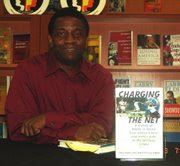src="http://pagead2.googlesyndication.com/pagead/show_ads.js">

I’m new to “Mad Men.” I still have not seen the first two seasons of the Emmy Award-winning series, but I intend to after I watch every episode of season three.
Like most people, I’m not a regular viewer of the cable channel AMC on which “Mad Men” appears each Sunday night. In fact, were it not for an article in
But now I click off Sunday Night Football every week from 10-11 to find out what’s going on with Don Draper, Roger Sterling, Betty, Peggy, Vincent the snake with the choir boy face, Sal the closeted gay, curvaceous Joan Holloway and the rest of the “Mad Men” cast.
“Mad Men” is extremely well-written and well-acted and the male characters are particularly well-drawn.
Could we find out more about the female characters? Yes.
Could the show be a bit faster-paced? Maybe.
But the 1960s were a slower-paced, more innocent decade than the present one. So the deliberate pacing of “Mad Men” seems evocative of the era.
Still, I did not go gaga over this show about 1960s Madison Avenue ad men and their lives and loves until this past Sunday.
Why? Because no previous episode really connected with me strongly as an African-American man.
That all changed with three scenes in last Sunday’s episode, which is set in 1963. Both scenes indicate clearly that “Mad Men” creator Matthew Weiner is ready to show us how the tumultuous 1960s impacted his characters.
The big question now is how far will he go?
In the first of those scenes, Draper is in his car along with his daughter’s teacher (who is about to become his mistress), and they’re listening to Dr. Martin Luther King Jr.’s “I Have A Dream” speech.
(Why would they be listening to that speech on a car radio at night when the speech was delivered during the day? Oh, well. I’m willing to allow Weiner that bit of artistic license.)
In the second scene, Draper’s wife, Betty, ostensibly holding a fund-raiser at her home for liberal Republican presidential aspirant Nelson Rockefeller—although the event was a ruse to spend time with her own secret lover—chats with two lady friends about American racism, Southern-style.
“As far as I’m concerned, the South is still in the 18th Century,” one lady says as Betty nods in agreement.
And in the third and most hopeful scene, the Drapers’ African-American maid, Carla, is in the kitchen doing housework while listening to radio coverage of the funeral service for four African-American girls killed in the racist bombing of a church in
Just as Betty Draper enters the kitchen, Carla immediately shuts off the radio. The scene beautifully illustrates without dialogue the stark differences in social standing and socioeconomic status between the two women.
Carla needs her job. She can’t have Betty thinking she’s one of those uppity Negroes who would head South at the drop of the hat to protest and agitate.
Carla’s ability to make a living depends on her staying in the good graces of the Drapers.
That explains why Carla merely simmered rather than explode earlier in season three when Betty’s father wrongly accused her of stealing.
But in the climax to the kitchen scene, Betty tells Carla, “You don’t have to turn off the radio. You can listen to your program if you want to.”
Now we know Betty and Don are at least sympathetic to the plight of African-Americans facing systemic oppression at home.
But do the Drapers, who live in suburban
Is it even possible for the Drapers to be more than sympathetic?
And what about Carla? Who is she? What about her family and friends? Where does she live?
What is Carla thinking about her existence as a working-class, middle-aged American woman working as a maid for a white, upper-class family?
We know this can’t be the American Dream for Carla or her peers.
Here’s hoping that Weiner will develop Carla as a full-bodied, multi-dimensional character, which is still rare for an African-American on a weekly television series—even a series set in 2009.
Maybe Weiner won’t go there. Maybe he can’t. Maybe I’m expecting too much from him.
After all, “Mad Men” has won the last two Emmy Awards for Best Drama without having one significant African-American character. Weiner may not want to stray too far from the thriving artistic territory he has tilled.
But I hope Weiner is daring enough, and wise enough, to mine the rich dramatic possibilities of a television series that contrasts the role of 1960s New York ad men with the rapidly changing country in which those characters reside.


No comments:
Post a Comment